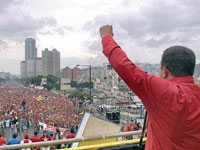Chavez's ex-wife urges Venezuelans to vote "no" in referendum
Hugo Chavez's ex-wife urged Venezuelans to reject the slate of proposed constitutional changes that would greatly expand executive power.

Urging Venezuelans to vote "no" in Sunday's referendum on the changes to the nation's charter, Maria Isabel Rodriguez compared approving the referendum to a "leap into the dark."
Rodriguez, a journalist, also urged opponents to go to the polls to prevent possible vote-rigging.
"It will be more difficult for fraud to take place if we all vote," Rodriguez said at a news conference Tuesday. She divorced Chavez in 2004.
Chavez declared Tuesday that the referendum "cannot fail" and that its success will "open the path to a new nation."
The president's differences with his ex-wife reflect the polarization across Venezuela, as rallies for and against the constitutional changes are surging. More protests were planned for Wednesday.
Such gatherings have raised tensions ahead of Sunday's referendum on reforms that would allow Chavez indefinite re-election, increase presidential terms from six to seven years and help the Venezuelan leader establish socialism in Venezuela.
In Caracas Tuesday, about 300 placard-waving students gathered outside the Catholic University Andres Bello, occupying a highway for four hours and causing rush-hour traffic jams, to urge Venezuelans to vote "no" on Sunday. The students contend the new constitution would give Chavez authoritarian powers.
"We students will keep coming out onto the street to demand freedom and democracy," said Roberto Diaz, a 21-year old law student at the university. Dozens of police and national guard monitored the demonstration that ended Tuesday evening without incident.
At the same time, about 5,000 mainly female Chavez supporters gathered in a stadium west of Caracas to back the referendum campaign. Participants in the "Women for Yes" rally, many dressed in Chavista red, waved posters with images of Chavez and Cuban leader Fidel Castro.
"The women in this process have so much to gain and nothing to lose," said Chavez supporter Luzbelia Marin. "After Dec. 2, the Magna Carta will incorporate equality between men and women in the different electoral processes and policies."
In Puerto La Cruz, 240 kilometers (150 miles) east of Caracas, at least 300 students protesting the referendum clashed with Chavez supporters outside the private Santa Maria University, police said. Some Chavez supporters appeared to have guns, an officer said.
"They are hitting each other and there have been gunshots. Police are trying to calm down those involved," police officer Alexander Gonzalez said by telephone from Puerto La Cruz. "We have no reports of injuries, but we know that there has been a confrontation."
On Monday, a man was shot to death after he tried to cross a protest, near the city of Valencia. Chavez blamed violent elements within the opposition for the killing.
Students have been one of the major sources of opposition to Chavez's referendum.
Some polls show Chavez faces considerable resistance in the referendum.
The government cites polls suggesting Chavez has an advantage, while the Caracas polling firm Datanalisis - in a nationwide survey this month - found 49 percent of likely voters opposed Chavez's reforms and 39 percent were in favor.
While the pollster has predicted some of Chavez's past victories, its results haven't always been on-target. A poll released by the firm in June 2004 found that 57 percent of Venezuelans would vote to recall Chavez, but the president handily won the vote two months later.
Chavez himself has suggested that if it loses, his government "would have to enter a period of profound reflection."
Yet, in a speech at an air base west of Caracas, Chavez was optimistic saying Venezuelans will vote "yes."
"On Saturday, the final attack begins, and Sunday ... it's written: the people will vote and will say 'yes' to the call we're giving to open the path to a new nation," Chavez said, alluding to the referendum that aims to modify 69 of the 530 articles in the constitution.
"We can't go backward, we cannot fail! We're obligated to victory, to continue triumphing. This is a battle of world proportions. And Venezuela, there, modestly there, is playing a very important role," Chavez said.
Subscribe to Pravda.Ru Telegram channel, Facebook, RSS!


